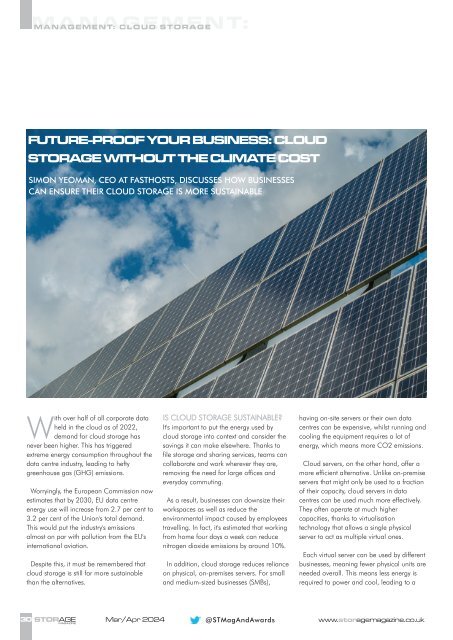ST2403
Create successful ePaper yourself
Turn your PDF publications into a flip-book with our unique Google optimized e-Paper software.
MANAGEMENT: CLOUD STORAGE<br />
FUTURE-PROOF YOUR BUSINESS: CLOUD<br />
STORAGE WITHOUT THE CLIMATE COST<br />
SIMON YEOMAN, CEO AT FASTHOSTS, DISCUSSES HOW BUSINESSES<br />
CAN ENSURE THEIR CLOUD STORAGE IS MORE SUSTAINABLE<br />
With over half of all corporate data<br />
held in the cloud as of 2022,<br />
demand for cloud storage has<br />
never been higher. This has triggered<br />
extreme energy consumption throughout the<br />
data centre industry, leading to hefty<br />
greenhouse gas (GHG) emissions.<br />
Worryingly, the European Commission now<br />
estimates that by 2030, EU data centre<br />
energy use will increase from 2.7 per cent to<br />
3.2 per cent of the Union's total demand.<br />
This would put the industry's emissions<br />
almost on par with pollution from the EU's<br />
international aviation.<br />
Despite this, it must be remembered that<br />
cloud storage is still far more sustainable<br />
than the alternatives.<br />
IS CLOUD STORAGE SUSTAINABLE?<br />
It's important to put the energy used by<br />
cloud storage into context and consider the<br />
savings it can make elsewhere. Thanks to<br />
file storage and sharing services, teams can<br />
collaborate and work wherever they are,<br />
removing the need for large offices and<br />
everyday commuting.<br />
As a result, businesses can downsize their<br />
workspaces as well as reduce the<br />
environmental impact caused by employees<br />
travelling. In fact, it's estimated that working<br />
from home four days a week can reduce<br />
nitrogen dioxide emissions by around 10%.<br />
In addition, cloud storage reduces reliance<br />
on physical, on-premises servers. For small<br />
and medium-sized businesses (SMBs),<br />
having on-site servers or their own data<br />
centres can be expensive, whilst running and<br />
cooling the equipment requires a lot of<br />
energy, which means more CO2 emissions.<br />
Cloud servers, on the other hand, offer a<br />
more efficient alternative. Unlike on-premise<br />
servers that might only be used to a fraction<br />
of their capacity, cloud servers in data<br />
centres can be used much more effectively.<br />
They often operate at much higher<br />
capacities, thanks to virtualisation<br />
technology that allows a single physical<br />
server to act as multiple virtual ones.<br />
Each virtual server can be used by different<br />
businesses, meaning fewer physical units are<br />
needed overall. This means less energy is<br />
required to power and cool, leading to a<br />
30 STORAGE Mar/Apr 2024<br />
@STMagAndAwards<br />
www.storagemagazine.co.uk<br />
MAGAZINE
















